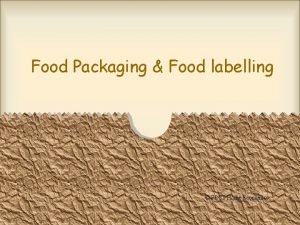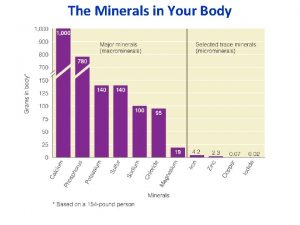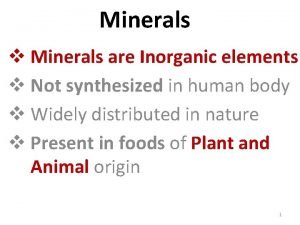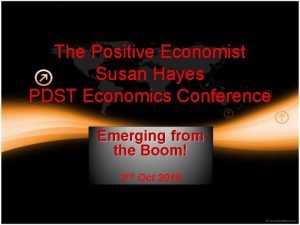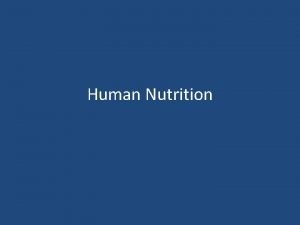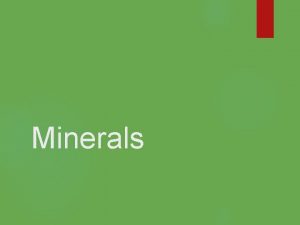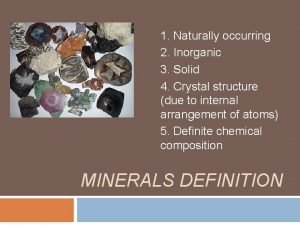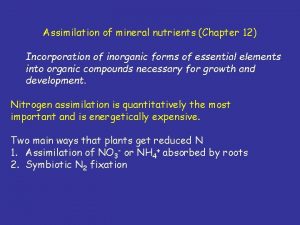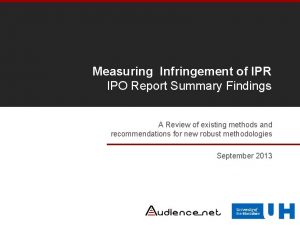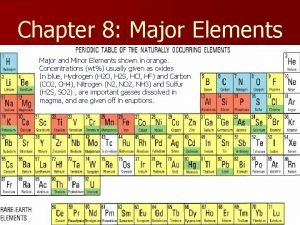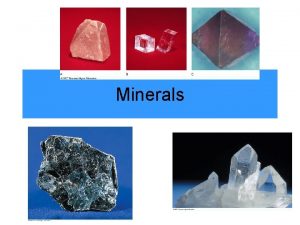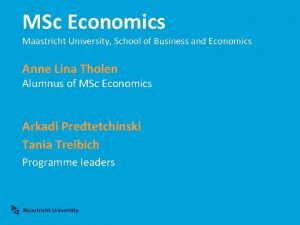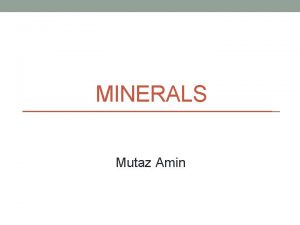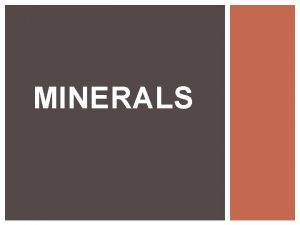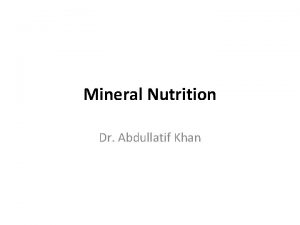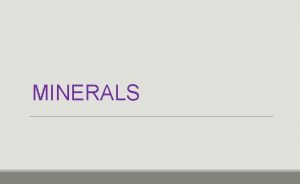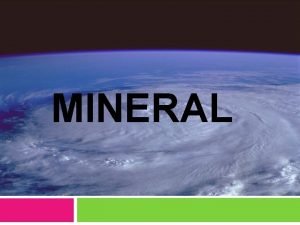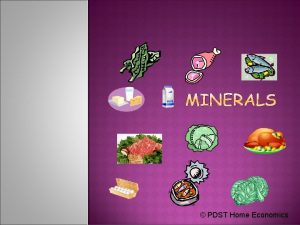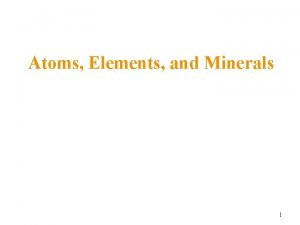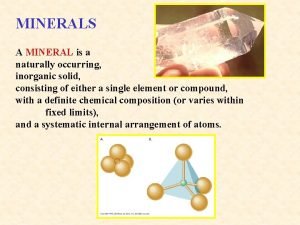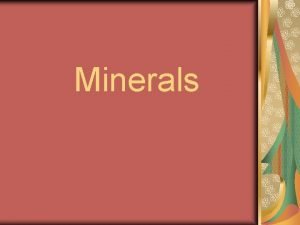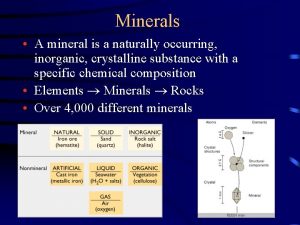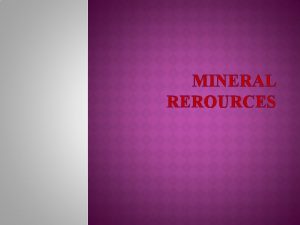Mineral Elements Inorganic nutrients PDST Home Economics Minerals




















- Slides: 20

Mineral Elements Inorganic nutrients © PDST Home Economics

Minerals n The human body needs 20 mineral elements in small amounts to protect us from diseases Major mineral elements Calcium Ca Phosphorus P Sodium Na Potassium K Magnesium Mg Chloride Cl Trace mineral elements Iron Fe Zinc Zn Iodine I Copper Cu

Calcium n n n Found in bone & teeth (99%) and rest in blood, muscles and nerves. Calcification is the word for the hardening of the bones They harden by absorbing Calcium and Phosphorus (Calcium phosphate)

Sources n n n n Milk (103 mg/100 g) Cheese (800 mg/100 g) Yoghurt. Tinned Fish e. g. Sardines 550 mg/100 g Leafy green veg. e. g. Spinach 70 mg/100 g Fortified flour Hard water White Bread 100 mg/100 g

RDA n n Children Adolescents Adults Preg/Lac 800 mg 1200 mg

Functions n n Making strong bones and teeth Blood Clotting Muscle contractions e. g. regular heartbeat Normal nerve function

Calcium Deficiency n n n Rickets in children Osteomalacia Tooth decay Poor blood clotting Irregular muscular contractions Malfunction of nerve cells

Absorption n n Only 20 -30% of the calcium we eat is absorbed. Certain things help or hinder absorption Assisting absorption n n Hindering absorption Vitamin D n. Phytates Parathormone n. Oxalates Phosphorus n. Excess fat Acid environment e. g. eat n. Excess protein vit. C with calcium n. Wrong calcium / Protein –calcium has to phosphorus ratio. bonds to protein to be n. Too many soft drinks absorbed

IRON n 50% of the iron in the human body is in the blood n The rest is in the liver, spleen and bone marrow. n Small amount in muscle protein and cell enzymes.

Sources of Iron Haem iron sources Non-haem iron sources Offal e. g. liver(11 mg/100 g) Meat products Chicken Eggs (2 mg/100 g) Whole cereals e. g. Wholegrain flour (4 mg/100 g) Dark green veg e. g. Spinach (4 mg/100 g) Fish

RDA for Iron n Children 8 mg n Adolescents 14 mg n Adults 10 mg n Pregnancy/Lactation 15 mg

Functions of Iron n Needed to make haemoglobin in the red blood cells which is needed to carry oxygen from the lungs to the body cells. Needed to make myoglobin which carries oxygen to muscle. Needed to make certain enzymes.

Iron deficiency n n n Tiredness Muscles tire easily Paleness Breathlessness Anaemia

Anaemia n n n Caused by shortage of haemoglobin due to lack of iron in diet or failure to absorb the iron More common in females – menstruation Symptoms: tiredness, dizziness, headaches, paleness, breathlessness, loss of appetite

Absorption of Iron n Only 15% of the iron you eat is absorbed. Things that help iron absorption: n Source: haem iron is easier to absorb n Vit C changes ferric iron to the ferrous state which is easier to absorb. n If haem and non-haem iron are eaten together Things that hinder absorption: n Excess Fibre n Tannins n Source: non-haem n Phytates (in wholegrains), Oxalates (in dark green veg. )

n n n n n Retaining vitamins & minerals in food n Cook for shortest possible Choose fresh food Don’t store for too long Store in cool dry dark place Eat raw if possible Avoid peeling Prep just before use Avoid steeping Sharp knife reduces oxidase damage Use pre boiling salted water n n n n Cook for shortest possible time Use as little liquid as possible Cover cooking pot Use cooking liquid in sauce or gravy Don’t add bread soda to greens Serve immediately after cooking. Avoid reheating

Potassium (K) Sources Functions Deficiency Pulses Green leafy veg. Banana Oranges Meat Milk Fruit juice Nuts Fluid balance in body tissue Healthy nerves Normal muscle activity Rare Mental confusion Cardiac arrest Weak muscles RDA: 0. 8 -3. 1 g

Sodium (Na) Sources Function Deficiency Salt Processed food Smoked food Cured food Meat products Cheese Snack foods Fluid balance in body tissues Healthy nerves Normal muscle activity Muscle weakness Muscle cramp Low blood pressure Loss of appetite RDA: 1. 6 g

Zinc (Zn) Sources Function Deficiency Meat products Cereals Oysters Legumes Enzyme activity Protein & carb. metabolism Hormone activity Healthy hair Healthy skin Frequent infection Reduced appetite Delayed healing Dry skin RDA 7 -12 mg

Iodine Sources Functions Deficiency Seafood Cod liver oil Iodised salt Veg. grown in iodine rich soil Making the thyroid hormone thyroxine Regulates growth & development Regulates metabolism Goitre Retarded mental development Lethargy RDA: 70 -160μg
 Pdst home economics
Pdst home economics What is food packaging in home economics
What is food packaging in home economics Pdst home economics
Pdst home economics Minerals are inorganic elements that the body
Minerals are inorganic elements that the body Iron deficiency anemia smear
Iron deficiency anemia smear Pdst economics
Pdst economics Organic and inorganic nutrients
Organic and inorganic nutrients Inorganic mineral definition
Inorganic mineral definition Inorganic mineral definition
Inorganic mineral definition Assimilation of mineral nutrients
Assimilation of mineral nutrients She said that, home economics stands for the ideal home.
She said that, home economics stands for the ideal home. Report writing pdst
Report writing pdst Ciara o'donnell pdst
Ciara o'donnell pdst Pdst ipo
Pdst ipo Lcvp summary report example
Lcvp summary report example Www.pdst.ie
Www.pdst.ie Minor elements
Minor elements Quartzite rock cycle
Quartzite rock cycle Minerals vs elements
Minerals vs elements Elements are moved between minerals during metamorphism by:
Elements are moved between minerals during metamorphism by: School of business and economics maastricht
School of business and economics maastricht

